Conscious Leadership
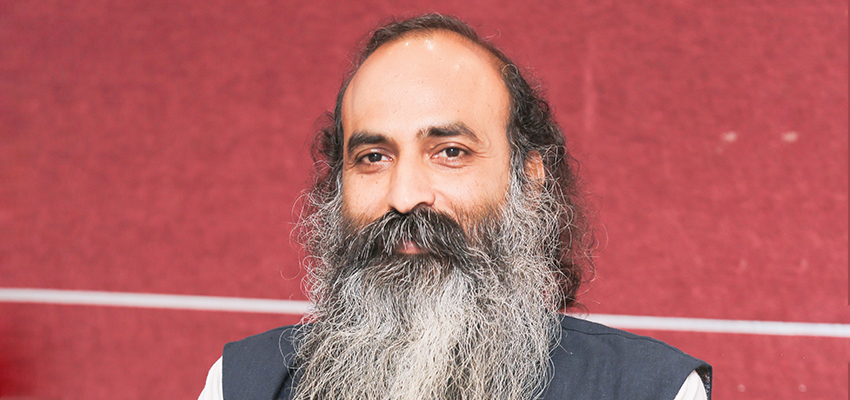
A former corporate CEO and a successful entrepreneur, Sri Anish put himself on the path of deeper spiritual quest and moved to the Himalayas, where he founded Saadho, a spiritual community. A visionary, an author, keynote speaker, leadership mentor, spiritual coach, Sri Anish, is the founder and chief mentor of Saadho Sangha Foundation, in Dharamshala, Himachal Pradesh.
Business is not a war zone, but somehow our perception, narrative and language is such that we are treating our Karmakshetra (professional world) as Yuddha kshetra (battle field), says Sri Anish. He has initiated many works towards raising the collective human consciousness, bringing spiritual awakening to corporate, social, business and educational leadership, and value based clarity to youth and future leaders. He is a regular speaker at some of the top institutions of India and is an advisor and mentor to many large institutions and start-ups alike. Sri Anish juggles many roles and has dedicated himself to help humanity transition to a more evolved version of collective life. He has initiated corporate programmes, working with top leadership to bring the awakening of conscious leadership and help create a renewed corporate vision and culture.
In an insightful conversation with Corporate Citizen, Sri Anish talks on various topics ranging from integrating science and spirituality, compassionate leadership, role of emotional resilience for CEOs and much more
"Conscious leadership is the new spiritually inspired paradigm which will not only transform our corporate culture, energise and integrate our teams, but will also help heal our planet"
-Sri Anish
Corporate Citizen: In the initial phase of your life you went through the ways of the world — study, competition, career, success, ambition, completed MBA and entered the corporate world. Was it curiosity or a connection that pushed you to move beyond the most surface understanding of life and to begin to peek into some of the underlying layers?
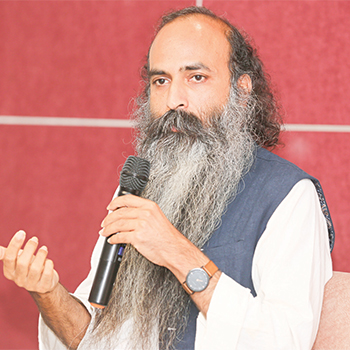
Sri Anish: Curiosity and connection sounds two different ways, but in reality, when curiosity and connection come together, that is when the magic starts to happen in life. Since, childhood I experienced a range of mystical events, but could never really understand them. When I started going to college, the usual template of life took over. But, somehow the inherent inner connection stayed and at the peak of my career, a profound curiosity arose. This curiosity pushed me to go out of the template, walk the path of Sadhana and explore the mystical connection and inner dimensions of life.
CC: Tell us about your entrepreneurial pursuit, wherein you co-founded an IT company called PeopleStrong?
I was quite a go-getter and a sharp student during my MBA, but I went through a series of interview rejections before I finally got a job. And, in a very short span of time, I realised I’m not cut out for a job—the whole experience was limiting and unfulfilling. That’s when I decided to start my entrepreneurial journey. After a few small start-ups, I co-founded an IT company with a partner in the USA. It started doing well—I then roped in my college friend Pankaj Bansal, to join this exciting world of entrepreneurship and that’s when the idea of PeopleStrong emerged. I guess it was around 2004-2005 when we wrote the initial business plan of PeopleStrong.
CC: Why would somebody drop all the luxuries, success, social applause and a very promising future and become a nobody, choosing contemplation, inner enquiry, meditation and silence?
I guess, problem was the template. This templatised way of living, where you get social applause from people who don’t matter to you, where you don’t have the time to be with your loved ones and no mind space to enjoy the luxuries that you earned. Where every next zero at the end of a certain amount in your bank doesn’t increase your joy. If you contemplate you realise that you are living in a dream bubble and unfortunately it is not even your own dream. It is the dream of social structure that you belong to. It is fixed and a very limiting template that we end up living and believing as our life.
Those days in Gurgaon, every morning while driving to office, I used to look at people’s faces in other cars, and almost every face had the expression of rush, urgency, lost in thoughts, talking to themselves or on phones. Similarly, every evening, faces were tired, or still sorting some business on phone. Only on Friday or Saturday evening, there was some visible joy and relaxation on people’s faces. For me the question was, this cannot be the only reason or purpose of life. I had to explore the truth of life, the ultimate purpose, the larger opportunity, and I was willing to find this out, at any cost.
"The law of life is not ‘competition’, it is rather ‘co-operation’. The whole nature flourishes on this law of ‘co-operation’. But somehow, human mind has been corrupted to give supremacy to ‘competition’ in every field of life"
CC: You run Bodhshala, a conscious leadership academy, wherein you work on awakening consciousness at leadership level. What does it really mean to lead deeply—a purpose-driven spiritual life within the corporate world?
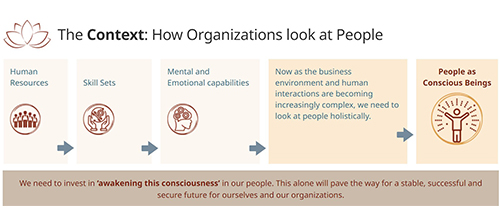
Consciousness is at the root of who we are and what we do. We need to know who we are, what our beliefs and motivations are, how our mind works and how our body operates. Unless we know this about our own selves, how can we lead anybody else effectively. Because, the secret is, at the deepest level, we all are the same. We all want to feel safe, acknowledged, cared for and loved, we all want to be motivated and joyful, we all want to lead a meaningful and purposeful existence. We all want to avoid humiliation, rejection and suffering. So, if you are self-aware, if you know your own mind, then you know the mind of everybody else. To me, that was a great realisation. Imagine if our leaders have this level of self-awareness, then their bodies will be healthier, minds will be sharper, hearts will be expansive and intuitiveness will be awakened. In this state of self-awareness, we know our Dharma well, in this state there is no difference between spiritual life and corporate world. Only in this state of self-awareness, our leaders will be able to create a solid institutional culture, integrate the interests of every stakeholder, take care of the well-being of their teams, create a larger impact, work towards nation-building and be able to lead in the most authentic way.
CC: You are helping create a renewed corporate vision and culture, rooted in the highest Dharma and wisdom. Tell us about your new narrative of the four Purushartha (Dharma, Arth, Kama and Moksha) and how does that fit in our fiercely competitive corporate world?
First of all, we need to understand that the law of life is not ‘competition’, it is rather ‘co-operation’. The whole nature flourishes on this law of ‘co-operation’. But somehow, human mind has been corrupted to give supremacy to ‘competition’ in every field of life. Anyways, that is a longer dialogue we will not go into it here.
Since ancient times, Bharat’s whole philosophy of development and growth, and the essential pursuits of human life rests on the four pillars—we call them four Purushartha. Our ancient rishis were not against Artha (pursuit of wealth) and Kama (fulfilment of desires), in fact they included these two in the four key pursuits of human life. But what they said was, Dharma (ethical and righteous ways) must be the foundation to pursue Artha and Kama, only then it will give you Ananda (Joy). And if the pursuit of Artha and Kama is not based on Dharma then it will bring a lot of Dukkha (suffering). We can see ample examples of these around us. And finally, our rishis (seer) said, all these three pursuits, should finally take you towards the fourth pursuit of Moksha (liberation) from all mental entanglements and self-created sufferings.
Now, the problem is, in our day-to-day business/corporate life, we have largely forgotten about the pursuit of Dharma and Moksha and the entire human pursuit has been towards Artha and Kama, which is a guaranteed recipe for suffering. That is the reason, no matter how much we have, whatever success we attain, inwardly we remain unhappy and there is a constant sense of lack or unfulfillment. Only when our pursuits are rooted in Dharma, will they bring abundant joy and fulfilment to us.
ABOUT THE BOOK
- Title: Let the Mud Settle : Your Evolutionary Journey towards Truth, Awakening and Ananda
- Author: Sri Anish
- Publisher: Wisdom Tree (17 November 2021)
- Pages: 186 (Paperback Edition)
- Price: ₹ 245.00 (Kindle) (Available at amazon)
- This book can become your lifelong friend to help you remember the essence of everything that matters. In this easy to relate and conversational style narrative, Let the Mud Settle is filled with deep insights, beautiful stories and contemporary teachings to guide your way to find your true self. It will encourage you to question the status quo in your life, be authentic in your feelings, investigate your thinking, open your heart to embrace all, practise awareness and regain the wondrous innocence of your inner child. This book will guide you to achieve lasting peace, connectedness, happiness, mindfulness, and most importantly, being liberated from all mental conditionings. Let the Mud Settle is a sacred journey, which will revive the joy of living.
"Curiosity and connection sounds two different ways, but in reality, when curiosity and connection come together, that is when the magic starts to happen in life"
CC: The corporate world is structured around the notion of control, to manage people, circumstances and situations. How does one redefine and deal with this in a spiritually aware way?
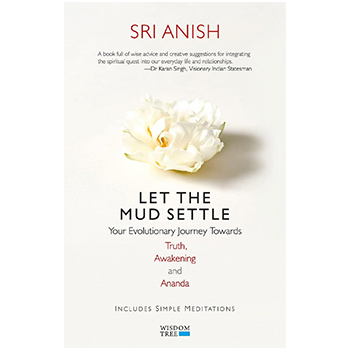
The truth is we are not in control of anything. Not even our own breath. Imagine one Hindenburg report takes the whole Indian stock market for a ride. So, what can we possibly control? Spiritual understanding says, that there is only one thing we can control and that is our own mind, our own thoughts, words and actions. All the effort and energy that we spend in controlling the outside events and situations is a waste. So, basically, we need to work towards controlling our own mind, so that it is calmer, clearer and it acts on our command. With this, we must start to give our 100 per cent to the work at hand, we call it Karma Yoga. Here, ‘perfection of action’ which is largely in our control, becomes our focus and not the end result. Because, the end result is a combination of our perfected actions (which is in our control) and of certain external factors, which may or may not be in our control always.
CC: How can a spiritually-inspired corporate paradigm be efficient and at the same time take a holistic view of human life?
One of our flagship programmes towards this is ‘AtmaBodh – Co-creating conscious leaders’. Every AtmaBodh retreat takes the participants on a transformative journey of self-awakening. We have witnessed that AtmaBodh retreats not only help participants in their professional lives, but also make their personal life much more harmonious. Look at it this way, if our minds are calmer and clearer won’t it help us in effective decision making, handling difficult situations, be more empathetic, be more creative and innovative, higher levels of energy and enthusiasm at work and also high levels of integrity and sense of belonging. These are the foundational attributes to make a person and institution highly successful. So, to me, conscious leadership is the new spiritually inspired paradigm which will not only transform our corporate culture, energise and integrate our teams, but will also help heal our planet.
CC: Is the practice of “Karma Yoga” really possible in our current business context?
If we want to achieve real happiness then we must learn to practice Karma Yoga and realise that the ‘work itself is its own reward’. Karma Yoga is possible in every context, we need to realise that we don’t practice it for any righteous or religious reasons, but we practice it for our own sake. I believe that, without practicing real Karma Yoga, we will continue to postpone our happiness in the future and link it with an expected outcome, which may or may not happen. The truth is, Karma Yoga is the secret formula of attaining constant and unconditional joyfulness.
CC: What is the role of emotional resilience as part of organisational culture and personal evolution?
Humans have become puppets of their own thoughts and emotions. Every little event outside, triggers a range of emotional turbulences in us. We need emotions to relate with others and to effectively function in the world, but we need these emotions to be healthy, positive and productive. Emotional resilience essentially means, first to be able to watch and then to master our emotions. It also means, to cultivate those emotions that are life enriching like love, compassion, inspiration, exuberance, authentic friendship, a sense of well-being for everybody etc. And, if you see, these are the emotions that every great leader has always displayed.
CC: Survival of the Fittest—have we taken this phrase too literally and implemented it in every sphere of our life?
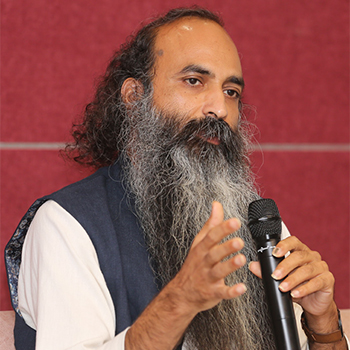
This phrase ‘Survival of the fittest’ is not true, entire nature works on the principle of ‘Survival of the Kindest’, the network of roots of trees in a forest is a proof of that. We humans have started moving against the laws of nature and we are paying heavy price for that in terms of our own physical/mental well-being and of course the impact of growing natural calamities. We created the world of business to bring ease and abundance to everybody but in the process, we have turned our business fields into battle fields. We have converted our Karmakshetra (field of work) into Yuddh kshetra (battle field). It is high time we realise that life is nurtured by kindness.
A small example of this is, you always like to purchase your grocery etc. from that local shop where the shop keeper is very kind to you, remember your childhood vegetable vendor who always gave you extra Dhania (coriander) for free out of his kindness.
SAADHO ASHRAM
Saadho ashram is located in a small village named Banouru in Dharamshala. Hidden from all the hustle, bustle and business of mankind in a small forest-type setting, blessed by the holy Himalayas on one side and vast expanse of the valley on the other side. Saadho Ashram is a non-residential space. The centre stage of the ashram is Swayambhu - The Shiva Mandir, the driving force of all the works, initiatives and vision of Sri Anish.